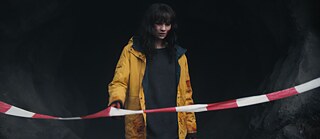German series exports
The dark soul of German TV

Autumn is just around the corner. If you are looking to spend a few hours curled up in front of the TV with just the right series, US film and television rating platform Rotten Tomatoes has a tip for you.
Dark, Netflix’s first original German production, tops the charts at rating platform Rotten Tomatoes as one of the US streaming service’s strongest and strangest science fiction tales. The platform rates film reviews from selected international media and named the show’s second season the best Netflix series worldwide in 2019. Dark left series heavyweights like Stranger Things and Black Mirror in the dust with this unexpected coup.

So how did the show manage to change viewers’ long ingrained viewing habits?
German Angst
The series is set in the fictional city of Winden, where disaster lurks around every corner. Everything is bathed in dark shades of grey, green and brown, and the camera moves through dark woods and the gloomy environment of Winden and the nuclear power plant on the outskirts of the city against a backdrop of suspenseful music. After two children disappear, the secrets of the families living there are revealed and with them German small-town horror. Little by little it becomes clear that the disappearance of the children is connected to a similar case from 1986. Dark thematises the threat of nuclear radiation in the year when the worst accident in the history of nuclear energy happened in Chernobyl, and mixes this apprehension with mysterious incidents and time travel. Before his disappearance, little Mikkel Nielsen shows his father with a magic trick. “How did you do that?” his father asks, and gets a mumbled and disturbing answer: “The question is not how, but when.” Although many viewers reported that the intertwined and complicated narrative strands “tied their brain in knots,” this has not diminished the series’ success. Quite the opposite in fact: Dark is a bit of a trend buster, since it is more of an anti-binge series whose plot leaves viewers shaking their heads puzzlement in front of their screens. As one Tweet making the rounds contended, “If you understand Dark, you can divide by zero.”


German TV, international audience
In Germany, the media and critics were astonished at the positive resonance coming out of America. With perhaps very German self-depreciation, they pointed out that Germany has never been known for high-quality or innovative television. Additionally, American producers are very good at dealing with dark topics with supernatural twists, as Stranger Things, Lost and Twin Peaks have proven. Some German media jumped on the praise bandwagon with a timid, “Why of course we can make good TV too!” and there has been talk of a “ground-breaking TV experience” and “fascinating paradoxes”.
The streaming service Netflix has tied author-director team Jantje Friese and Baran bo Odar, who are also a couple in real life, to the platform with an exclusive contract. Nico Hofmann, director, managing director of UFA GmbH and producer of internationally successful German series such as Charité and Ku’damm 56 responded that apparently a fierce competition for German talent had broken out, before adding: “But we don’t need Netflix to kiss us awake.” The TV business is currently in flux, and not just overseas. At the latest after the internationally successful German historical series Deutschland 83, Charité, Das Boot and Babylon Berlin, German TV production companies are now taking a serious look at international market. Why shoot for just a German audience when the world is learning to love German TV? US streaming services such as Netflix, on the other hand, take a slightly different approach and initially concentrate on serving the already booming national market. A German series made by German screenwriters and directors can bind the German audience to the pay TV stations more effectively. And if this series is well received in the USA as well, then that is a win-win situation.
